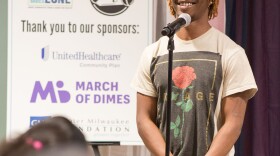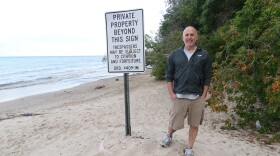Each month, UWM distinguished professor of atmospheric science Paul Roebber talks with Lake Effect as part of our climate conversations series. In this final installment, two policy experts join the conversation.
Amber Meyer Smith is from the organization Clean Wisconsin. She’s a member of Gov. Tony Evers’ climate change task force.
"Evers' executive order also lays out a goal of 100% clean energy by 2050 and that’s really what we’re trying to get to right now. I think it’s a very doable goal, but we are going to need bold action to get us there," she says.
>>Evers Buckles Down On Clean Energy Goals
Meyer Smith says the task force’s assignment is to come up with recommendations that will be submitted to Evers by the end of October. She says citizen input is critical to the process, so the task force is hosting a series of virtual public listening sessions and people can submit comments online.
But Roebber worries climate policy might come too late.
“Scientists have been warning the world about climate change for about three decades, and at least for the last 20 to 25 [years,] we’ve understood the parameters of the problem pretty well, scientifically. We’re dealing with something that you’re talking about having to undertake actions over many years,” Roebber says.
>>The Impacts Of Climate Change Can Be Seen In The Plants Budding Around You
Shalanda Baker agrees that we can't afford to wait. She’s a professor at Northeastern University School of Law in Boston. Before moving to Boston, Baker was a Hastie Fellow at UW-Madison.
Baker says transitioning swiftly to renewable energy and an energy system that is “nimble” is critical.
“Thinking about utility structure and whether or not we should be kind of relying on traditional investor-owned utilities in the same way, or they change roles and maybe are purely running the electricity through the lines, but all of our communities are kind of putting our energy in that system,” Baker says.
Baker says in order to transition to "that new world" requires courage, ambition, and technology.
“But we have to do it in a way that leaves the poorest people, the most marginalized ... so they can stay in place when the inevitable storms come, because they are coming, and the fires and the floods,” Baker says.
Meyer Smith believes change is in the air.
“Think about these wonderful youth movements on climate that we’ve seen leading the way. It gets conversations started. It gets you thinking about the spectrum of opportunity of where we could go, and the action that they demand,” Meyer Smith says. “You’re going to start having real political problems if you keep sticking your head in the sand on climate change. It is not a sustainable position to say 'no.' ”
Shalanda Baker says there’s a compelling economic argument to be made in bringing climate policy to life.
“Because that’s ultimately where we end up with these sorts of things. I think there’s a case to be made that if we have a strong base and we have folks who are able to bounce back after a major climate event, that makes us all stronger. It’s not as much of a drag on the overall economy,” Baker says. “For me, the moral argument is the first, the second is our fates being linked … and I think the third is if all boats are lifted, we’re all better off.”
Roebber says Baker and Meyer Smith’s perspectives demonstrate that there are many ways to change the climate change trajectory.
“There are things that we can do on many different fronts that would help make the future a lot less grim than it looks right now, and I think that’s the big takeaway here, but we have to start doing it,” Roebber says.
Have an environmental question you'd like WUWM's Susan Bence to investigate? Submit below.
_






